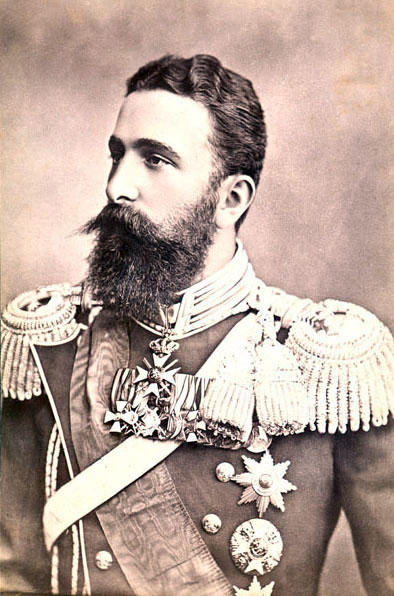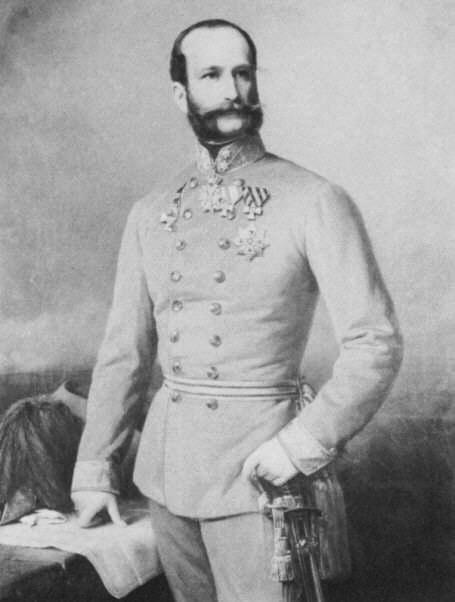by Scott Mehl © Unofficial Royalty 2014

Prince Alexander of Battenberg, Prince of Bulgaria; Credit – Wikipedia
Prince Alexander Joseph of Battenberg (known as Sandro) was born on April 5, 1857, in Verona, Kingdom of Lombardy-Venetia, now in Italy. His parents were Prince Alexander of Hesse and by Rhine and Countess Julia von Hauke. Julia had been a lady-in-waiting to Alexander’s sister, Marie of Hesse and by Rhine, the future Empress Maria Alexandrovna of Russia (wife of Alexander II, Emperor of All Russia), and the couple met while Alexander was visiting St Petersburg, Russia. As the Emperor would not condone a relationship between the two, they left Russia and were married in 1851 in Breslau, Kingdom of Prussia, now Wroclaw, Poland. Because their marriage was morganatic, Julia did not gain any of her husband’s titles and their children would not be eligible for succession to the Hesse Grand Ducal throne. However, her brother-in-law, Grand Duke Ludwig III of Hesse and by Rhine granted the title Countess of Battenberg to Julia and the children of the marriage. A few years later, this was elevated to Princess of Battenberg.
Alexander had four siblings:
- Princess Marie of Battenberg (1852–1923), married Gustav, Count of Erbach-Schönberg, had four children
- Prince Ludwig (Louis) of Battenberg (1854–1921), married Princess Victoria of Hesse of Hesse and by Rhine, had four children including Alice who married Prince Andrew of Greece and is the mother of Prince Philip, Duke of Edinburgh; Louise who married King Gustaf Adolf VI of Sweden; and Louis Mountbatten, 1st Earl Mountbatten of Burma); In 1917, Louis and his children gave up their German titles and took the surname Mountbatten and he was created the 1st Marquess of Milford Haven
- Prince Heinrich (Henry) of Battenberg (1858–1896), married Princess Beatrice of the United Kingdom, daughter of Queen Victoria, had including four children including Princess Victoria Eugenie of Battenberg who married King Alfonso XIII of Spain
- Prince Franz Joseph (1861–1924), married Princess Anna of Montenegro, no children
Prince Alexander often visited his aunt in Russia and became close to his uncle by marriage Alexander II, Emperor of All Russia. It was through this relationship that Alexander’s future role as a sovereign materialized. Bulgaria became a principality of the Ottoman Empire under the terms of the Treaty of Berlin in 1878. Alexander II of Russia proposed Alexander for the newly created throne, and he was unanimously elected as Prince of Bulgaria in April 1879. He arrived in his new homeland in July 1879, swearing allegiance to the new Bulgarian Constitution.
After a contentious reign, often caught between the conflicting goals of the Bulgarian politicians and the Russian Emperor, Alexander fell victim to a military coup on August 20, 1886. He was forced to sign his abdication before being rushed out of the country and handed over to the Russians. Following a counter-coup a few weeks later, Alexander returned to Bulgaria. However, with the Austrian, German, and Russian governments all working against him, he formally, and freely, relinquished the Bulgarian throne on September 7, 1886, and left Bulgarian the following day.
On February 6, 1889, Alexander married opera singer Johanna Loisinger, at which point he assumed the title Count von Hartenau, which he used for the remainder of his life. The couple had two children:
- Assènne Ludwig Alexander, Count von Hartenau (1890–1965), married Bertha Husa-Ramos, no children
- Marie Therese Vera Zvetana, Countess von Hartenau (1893–1935), married CharlesErcula Boassevan, no children

Johanna Loisinger with her two children circa1894, Credit – Wikipedia
The couple lived in Graz, Austria where Alexander held a post in the Austrian Army. He died at his home in Graz, Villa Hartenau, on October 23, 1893. Alexander was initially buried in Graz, but later his remains were returned to Bulgaria, and a state funeral was held at the St Nedelya Church in Sofia, at the direction of the new Prince Ferdinand of Bulgaria. Alexander later was entombed at the newly built Battenberg Mausoleum in the center of Sofia, Bulgaria.
Bulgaria Resources at Unofficial Royalty
- Principality of Bulgaria/Kingdom of Bulgaria Index
- Bulgarian Royal Burial Sites
- Bulgarian Royal Dates
- Profiles: Bulgarian Rulers and Consorts
- Rulers of Bulgaria
This article is the intellectual property of Unofficial Royalty and is NOT TO BE COPIED, EDITED, OR POSTED IN ANY FORM ON ANOTHER WEBSITE under any circumstances. It is permissible to use a link that directs to Unofficial Royalty.



